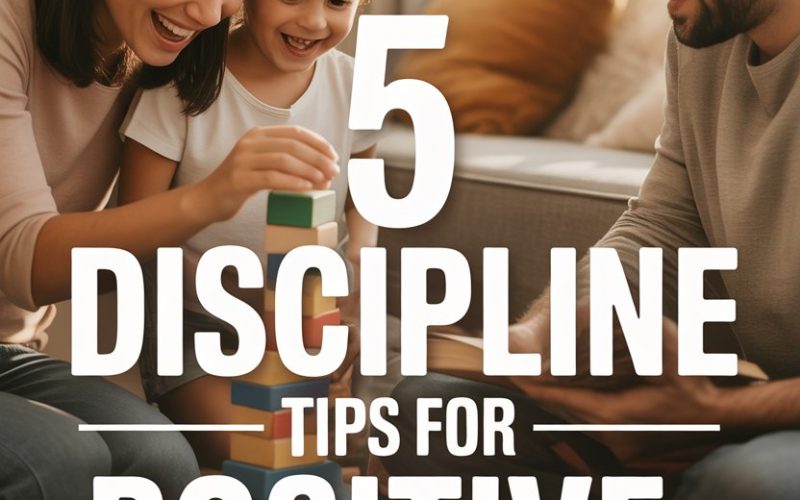Parenting can sometimes feel like trying to assemble IKEA furniture without the instructions—only the furniture is your offspring and the instructions are missing, possibly chewed up by the family dog.
If you’re searching for ways to discipline that nurture your child without crushing their spirit (or your own), you’re in good company.
Here are five tips for positive discipline that work, even on the busiest days.
1. Keep Your Cool (Or at Least Pretend)
The tiny humans in our lives have a knack for pushing buttons we didn’t know existed.
Whether it’s the old “let’s see what happens when I pour my juice onto the cat” trick, or a tantrum in the middle of Tesco, it’s tempting to meet chaos with chaos.
But research from Harvard University suggests children learn emotional regulation best from calm adults.
When you respond to outbursts with a level tone and steady presence (even if your internal monologue is a flurry of expletives), you’re teaching your kids how to handle big feelings.
Take a breath. Insert a pause. If you need to, step into the next room and mutter something about “serenity now” under your breath.
Then, address the behaviour, not the child.
A firm, “We don’t hit. Hitting hurts,” beats a lecture delivered in the heat of the moment every time.
2. Connection Before Correction
Discipline literally means “to teach,” not “to punish.” Kids are far more likely to listen when they feel understood and connected.
This isn’t just fluffy parenting talk—brain science bears it out. Daniel Siegel, author of The Whole-Brain Child, explains that children’s nervous systems calm when parents empathise.
Imagine your toddler’s had an epic meltdown over the blue cup being in the dishwasher.
Instead of immediately jumping into “You can’t scream like that,” try, “You really wanted the blue cup. That’s hard.” Then, when they’re calmer, you can address the screaming.
This doesn’t mean you have to agree with the behaviour. It just means you acknowledge their feelings. Turns out, kids have big feelings about small cups. Who knew?
3. Be Consistent Without Being Rigid
Consistency is the unsung hero of parenting. Children thrive when they know what to expect (even as they test those boundaries with the dedication of a lab scientist).
Establish simple, clear rules and stick to them. If teeth are brushed before bed tonight, they should be brushed before bed tomorrow, even if you’re both tired enough to consider skipping it.
Consistent boundaries help kids feel safe.
That said, life happens. Maybe the bedtime routine gets thrown off when the school play runs late (starring your sheepishly grinning child as “Tree No. 2”).
Flexibility is part of positive discipline too. Explaining why something is different (“Tonight’s special, but usually we…”) keeps routines intact without feeling like boot camp.
4. Focus on What You Want, Not Just What You Don’t
“Don’t run!” “Stop yelling!” “No hitting!” Sound familiar? If you’re like most parents, you can deliver these warnings in your sleep.
The trouble is, the brain often skips the “don’t” and hears “run,” “yell,” or “hit.”
Flip the script. Try stating the behaviour you want to see: “Walk with me, please.” “Use your inside voice.” “Gentle hands.”
It sounds simple, maybe even a bit Pollyanna-ish, but studies show children respond better to positive phrasing.
When they get it right, even for three seconds, pile on the praise. “You walked so calmly in the shop. Thank you!”
You’ll be amazed how quickly they start seeking out your attention for doing the right thing. (This works on partners too, but that’s a different column.)
5. Logical Consequences Over Punishment
Time-outs and groundings can work, but they often just fuel resentment or confusion. Instead, natural and logical consequences turn missteps into valuable lessons.
For example, if your child refuses to wear their coat, let them feel chilly for a few minutes (assuming it isn’t sub-zero, and you’re not raising them in an igloo).
If toys aren’t picked up, they take a “holiday” on a high shelf for a day.
The key? Stay calm and matter-of-fact. You’re not the villain in a fairy tale meting out random punishments. You’re helping your child see that actions have results.
Parenting expert Jane Nelsen, author of Positive Discipline, calls this “kind and firm at the same time.” Your child learns, and you get to skip the power struggle. Win-win.
Getting Through the Day (With or Without Your Sanity)
Busy parents don’t need a 400-step parenting plan. You need strategies that work during the morning dash, the witching hour, and the millionth request for a snack.
Treat positive discipline as an experiment. Some days you’ll be the Zen Master of Calm, other days you’ll be channelling your inner Basil Fawlty. That’s normal.
The point isn’t perfection. It’s progress.
Kids (and grown-ups) learn from mistakes. If you lose your temper, apologise and move on. You’re modelling humility, which is a pretty great lesson too.
And while there’s no magic wand for discipline, these five tips can help restore peace—or at least keep the juice off the cat. That’s a win in any parenting book.





